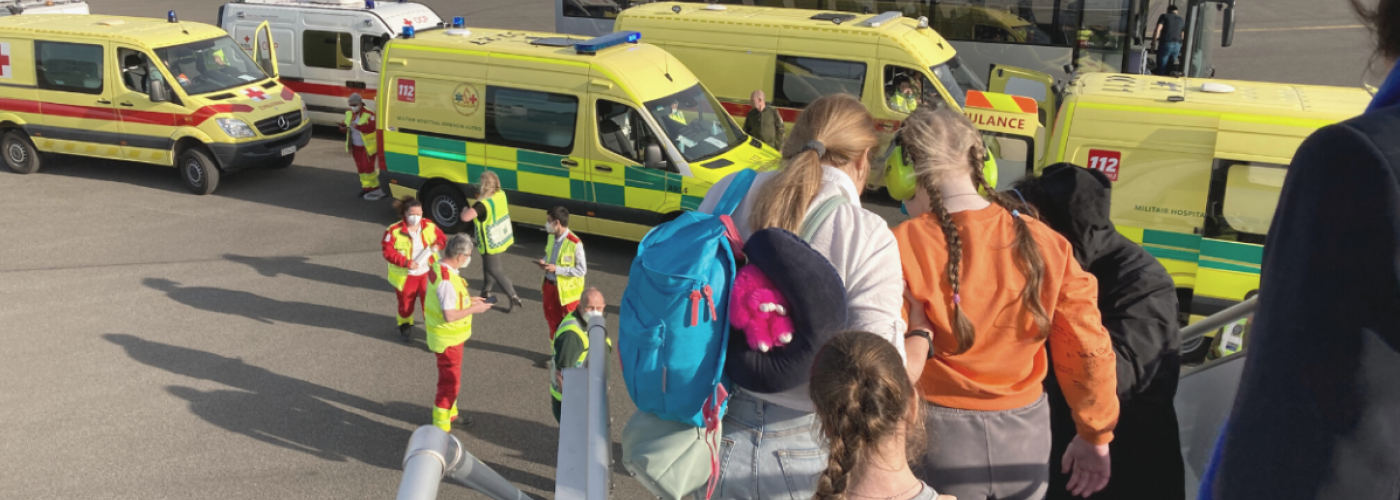Back in March 2022, we reported on the more than 9 million euros in humanitarian aid to Ukraine. Unfortunately, the conflict is far from over. Since the start of the war, the Russian military has already caused hundreds of billions of euros worth of damage there.
Winter is an additional ordeal for the already hard-hit country anyway. The Russian attacks on power supplies are causing massive power outages, leaving millions of people out in the cold. All the while, temperatures there can drop to -25°C for weeks in winter! Water supplies are also being affected.
Children are suffering greatly too. Not only are they victims of bombings and unexploded ordnance, they are often unable to attend school. Many school buildings have been severely damaged or completely destroyed. Because of the power outages, online learning is also extremely difficult. Moreover, the children are suffering from the biting cold.
That was why, in autumn, Belgium decided to give Ukraine some additional support, with a particular focus on children and healthcare. Belgium also wants to boost grain transport from Ukraine. In addition, we are making a serious effort to step up the battle against impunity, especially for sexual violence.
The following is an overview of all the civilian aid provided by Belgium to Ukraine since the start of the war, illustrated with some examples. The total amount comes to 91.4 million euros.
Humanitarian aid: 69.4 million euros
As early as Day 1 of the war – 24 February 2022 – the Belgian emergency intervention team B-FAST sent tents, kitchen kits, blankets and hygiene kits, among other things. Since then, Belgium has continued to focus on emergency goods. These include medical equipment such as surgical gloves, respirators, needles and syringes, masks and medications. But also milk powder, generators for generating electricity, food, camp beds, sleeping bags and so on. Some of the emergency assistance was provided by the FPS Public Health.
In addition, Belgium spent much of its humanitarian aid through specialist international institutions. For example, the International Committee of the Red Cross (ICRC) received 8 million euros, in part to help local communities remove unexploded explosives.
With the 14 million euros of Belgian support, the UN Children's Fund (UNICEF) is ensuring that school-aged children and young people can continue to attend classes as safely as possible. The sanitary facilities in school buildings are being repaired and shelters are being built. Furthermore, UNICEF is helping parents feed their newborn babies and young children.
The Norwegian Refugee Council is also supporting educational activities, specifically in the severely destitute south of Ukraine. With Belgian aid – 2 million euros – the organisation provides teaching materials and organises psychosocial counselling for children, their families and teachers.
500,000 euros flowed to Geneva Call, a neutral, impartial and independent humanitarian organisation that, in the event of a conflict, encourages the warring parties to respect humanitarian principles. It involves protecting civilians, ensuring access to humanitarian aid and so on.
Furthermore, Belgium is supporting the Grain from Ukraine initiative with 10 million euros. In doing so, the World Food Programme (WFP) is shipping Ukrainian grain through the Black Sea at the behest of the Ukrainian government. The Belgian contribution sponsors transport to countries such as Sudan, where millions of people are living in acute famine.

Resilience and reconstruction: 15.65 million euros
The International Organization for Migration (IOM) received 10 million euros to repair some ten hospitals located on the front lines or recently liberated by the Ukrainian army. This should allow them to reopen their doors and provide patients with urgent care. Another priority is repairing water pipes, sanitary facilities and heating systems, especially in schools.
Our Peacebuilding Department is supporting a project to renovate a school (Sumy region) and a nursery (Kharkiv region). Also in the Kharkiv region, shelters are being set up at a nursery and a high school.
This section also includes some extremely useful niche projects. For example, Belgium will have the archive of the Ukrainian Foreign Ministry digitalised. This archive contains 66,000 documents, including a number of bilateral treaties. The digitalisation should protect the archive from possible destruction during the war.
In addition, Belgium will help Ukraine preserve its heritage and cultural identity by creating safe storage places for its artworks through a project with the Ukrainian Ministry of Culture.
Human rights and battle against impunity: €6.4 million
Belgium fully supports the battle against sexual violence, including through a €2 million contribution to the United Nations Population Fund (UNFPA). UNICEF is spending 500,000 euros to promote, among other things, the rights of children during armed conflict.
Both the Office of the High Commissioner for Human Rights (OHCHR) and the Organization for Security and Co-operation in Europe (OSCE) are receiving support to carry out monitoring missions in the battle against impunity. In this regard, the International Criminal Court will also receive 500,000 euros.
This section includes a further 300,000 euros in support for European Endowment for Democracy. This organisation supports civil society and the independent media with the aim of countering disinformation, among other things.
Total civilian + military = 332.9 million euros
Much of the civil aid is managed by FPS Foreign Affairs, including through Belgian Development Cooperation and the Peacebuilding Department. The inter-ministerial emergency intervention team B-FAST – for which our FPS provides the secretariat – is also taking on quite a bit. In addition, there are some contributions by the FPS Health and Justice.
The federated entities - mainly Flanders and Brussels - donated about 3.5 million euros. The total civilian support thus amounts to approximately 95 million euros.
Military support goes via the Department of Defence. The total aid to Ukraine, military plus civilian, so far amounts to around 332.9 million euros.


